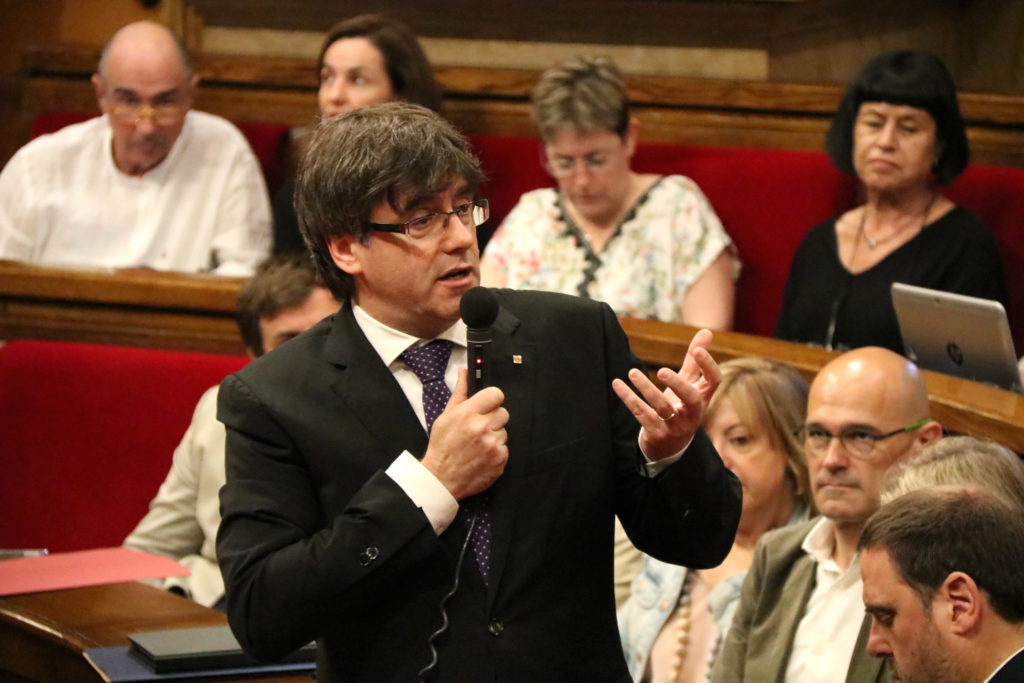31.05.2017 - 18:00
|
Actualització: 01.06.2017 - 15:15
The Catalan President, Carles Puigdemont, has sent a letter to the Council of Europe’s Venice Commission in order to seek its “collaboration” for the celebration of an independence referendum in agreement with Spain. Puigdemont informed the Parliament plenary on Wednesday that he wrote the letter on May 29th explaining the Government’s intention of celebrating the referendum as well as the refusal of Spanish President, Mariano Rajoy, to negotiate it. The Catalan president said in the missive that he was “convinced” that the Catalan issue will be “of interest” to the Venice Commission because of its “political significance” and put himself “at the disposal” of this international body to discuss it further.
At the end of April, the alternative left coalition CSQP, which is in favor of holding a referendum but not necessarily independence, said they would support a unilateral referendum if it had international guarantees. CSQP’s spokesperson, Joan Coscubiela, said that the Venice Commission, the Council of Europe’s institution in charge of these kind of processes, has to endorse the referendum before his party can support it. Back then, governing cross-party pro-independence coalition Junts Pel Sí celebrated this position, saying the group had “taken a step forward” by joining those that consider the celebration of a referendum in Catalonia even if it is done “without Spain’s permission”.
During a debate with CSQP, when their leader, Lluís Rabell, reproached the Government for trying to organize the referendum by side-lining the demands of the cross-party National Pact for a Referendum (PNR), Carles Puigdemont confirmed that the Catalan Government had written to the Venice Commission. Puigdemont accused the alternative left coalition of “underestimating the Government” after not attending the meeting he convened on Monday and showed the plenary that he is actually seeking the international collaboration that CSQP asked for.
However, the left-wing party said that the letter “does not do” what the resolution from Parliament said. According to Coscubiela, the letter is a “manipulation” because it “only informs” the Venice Commission of the Parliament and Government plans, but does not seek, in their opinion, its direct intervention.
In his letter to the Venice Commission, Puigdemont explains that Parliament approved a resolution in May underscoring the executive’s “willingness to celebrate a referendum about the political future of Catalonia in accordance with the Spanish government”. He added that the resolution also urged the government to “initiate the necessary procedures to have,” in this scenario of agreement, the “collaboration of the Venice Commission”.
Puigdemont said in his letter that the Venice Commission expertise can serve “without any doubt” as a “guarantee” in a democratic process such as a self-determination referendum. “Europe was built on the basis of dialogue and it is through dialogue that we need to face and solve our current challenges,” he insisted. Although Puigdemont admitted that the Spanish government has so far rejected all calls for a referendum negotiation, he added that his executive “has kept the door open at all time” to the possibility of coming to an agreement about one.
“I am convinced that this information will, because of its political significance, be of interest to the Venice Commission. Therefore, I am at your disposal in case you need any clarification on the issue,” Puigdemont concluded.
The leader of the Catalan Socialist Party (PSC), Miquel Iceta, warned that the Venice Commission will not interfere in the Catalonia debate. “This body will say that a referendum outside the Constitutional framework is not possible,” he said in the plenary. Iceta added that Catalans are at “a dead end” and criticized Puigdemont’s government for not “taking into account the consequences of their decisions”. “They are irresponsible,” he criticized.
The Venice Commission
The Venice Commission can only write reports at the request of another body of the Council of Europe, a member state, an international organization, or by its own initiative. This means the Catalan Government is not able to ask directly for the Venice Commission’s opinion on the referendum and has to rely on a petition by the Spanish government (which is unlikely), a body of the Council of Europe, another international organization, a third country, or the organization itself.
The Venice Commission ‘guidelines’ of good practices for referendums state that any referendum “must comply with the legal system as a whole” and “cannot be held if the Constitution or a statute in conformity with the Constitution does not provide for them”. Therefore, a unilateral referendum against the will of the Spanish government could easily fall outside the recommendations of the Venice Commission.



